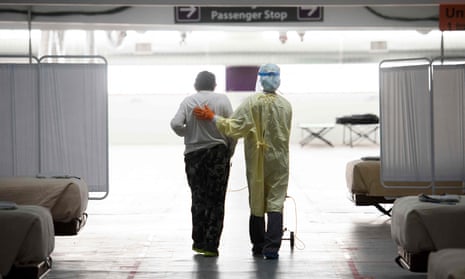One million have died from Covid-19 in the United States, a catastrophic milestone that was reached despite the wonders of modern science and the wealth that courses through this country. More than two years into the pandemic, it is hard to shock people any longer. One hundred thousand deaths, it seemed, attracted far more attention.
How did we get it here? How much of this mass death was preventable? These are questions that we will be sorting out for many years to come. There are no simple answers. In order to have a fighting chance in the next pandemic, though, it’s incumbent to consider just what went horrifically wrong.
First, it must be noted that America, among advanced nations, was not alone in enduring terrible loss from Covid. Both the United Kingdom and Italy have comparable death rates. Multiple waves have overwhelmed other European nations with superior healthcare apparatuses. Taming a pandemic is incredibly difficult and few countries emerged unscathed.
Given America’s vast size and decentralized governance structure—federalism guarantees 50 states can often act like 50 nations—a zero-Covid approach would have been unfeasible. Some liberals looked longingly to New Zealand, an island nation smaller than New York City, for guidance, though even the Kiwis eventually gave up on such radical lockdowns. China is currently trying to stamp out Covid by imprisoning millions of their own citizens in their homes and restricting travel abroad. The Covid death rate remains low, but the social repercussions of such severe policies will be felt for the rest of the decade, as more affluent Chinese citizens consider fleeing a country that has no regard left for their civil liberties.
Still, there are clear failures unique to the United States. The aforementioned federalism made national public health messaging and decision-making exceedingly difficult. Donald Trump, deeply unhinged and ignorant, was the worst president possible to sit atop such bureaucracy. With little federal guidance, individual governors, mayors, and county executives were on their own to set policy, flailing about against a new virus few truly understood. Some, like Jay Inslee in Washington and London Breed in San Francisco, rose to the occasion, initiating well-timed early lockdowns and placing rational public health officials at the forefront of their pandemic responses. Others, like Andrew Cuomo in New York, failed miserably, dithering until it was too late.
From the beginning of the pandemic, public health messaging was deeply muddled, with various epidemiologists and self-appointed experts, along with government officials, taking to the internet to offer conflicting advice. In February 2020, as Covid was beginning to spread in the United States, mainstream media outlets and a sizable number of officials were telling Americans to actively avoid wearing masks. The rationale – save high-quality masks for healthcare workers – did not justify telling ordinary people to ignore their common-sense and the long history of masking during the flu pandemic of 1918.
The early months of the pandemic produced other nonsensical policies from experts who should have known better. Quickly, scientists learned Covid was airborne, yet parks and other outdoor spaces remained shuttered for months. While the virus was ravaging New York, playgrounds in the Midwest had red tape thrown around them. Few states, liberal or conservative, emphasized the need for proper ventilation in public and private buildings. More outdoor events, coupled with mask-wearing, could have ushered a faster return to normalcy as Americans were educated about the importance of proper airflow. A hundred years ago, scientists and doctors knew it was better to treat flu-ravaged patients outside. Some municipalities even pursued outdoor schooling. For reasons unclear, these lessons were lost to time.
The vaccine era brought more failure. Public health experts either didn’t understand Covid would produce variants or misled Americans on the nature of the Moderna, Pfizer, and J&J vaccines. Those that first took vaccines were led to believe that Covid would simply stop spreading once they were vaccinated and all pandemic-era precautions could be ended. Dr Anthony Fauci and others told the vaccinated they could cluster unmasked without any fear that Covid would infect them anew. What vaccines did do remarkably well was prevent people from going to the hospital. But they were never pitched this way – rather, many believed they were magic potions that would make Covid disappear – and the surge of breakthrough infections in the summer and fall of 2021 further sowed distrust. Fauci, who had once called Covid a pandemic of the “unvaccinated,” couldn’t plausibly say this any longer when the Omicron variant was tearing through highly vaccinated locales like New York.
Right-wing misinformation doomed older Americans in Republican-leaning counties. Though Trump himself was a booster of the vaccines because they were developed under his administration, it was Joe Biden administering them, and Republican demagogues turned on the products of Operation Warp Speed. Conspiracy theories, fueled by the right, undercut trust in the vaccines. Conservatives rushed to unproven treatments. The deadly Delta wave in 2021 came for the Republican-dominated states that wrongly believed Covid was simply a problem for the big liberal cities. Rural counties suffered mightily.
Other lessons from the pandemic do not fit neatly into the narratives of the left or the right. Few Democrats want to remember it was Kamala Harris, during a vice presidential debate in 2020, who said she’d hesitate to take a vaccine if Trump were president. Months later, she would be taking doses from the very vaccines she was foolishly attacking for political points. Right-wingers can’t acknowledge that fewer Americans would have probably died if Trump had never been president.
It’s possible, too, that vaccine uptake in America would have been more widespread if greater options were offered and effective treatments were prioritized. Both Moderna and Pfizer rely on mRNA technology not traditionally used in vaccines; their novelty bred conspiracy-minded thinking, especially on the right. With J&J’s vaccine effectively off the market—the FDA strictly limited it because of a risk of a rare clotting condition—only mRNA vaccines are widely available until Novavax’s vaccine, which uses conventional protein technology, is greenlit later in the summer. In retrospect, it would have been beneficial to have a proven pharmaceutical giant like Pfizer producing a conventional vaccine to entice a broader range of Americans.
With new variants and future pandemics inevitable, Congress must authorize far more in federal funding for proper preparedness. Research must never cease—particularly into medical treatments for Covid and other pandemic strains—and local health departments should be properly supported. Hospital capacity must be expanded wherever possible, especially in the wake of so many ICU facilities, in small towns and big cities alike, rapidly filling up during various waves.
One million people should never have to die from another pandemic. Not in America, a country built to do so much better.
Ross Barkan is a journalist based in New York City. He is the author of Demolition Night, a novel, and The Prince: Andrew Cuomo, Coronavirus, and the Fall of New York

